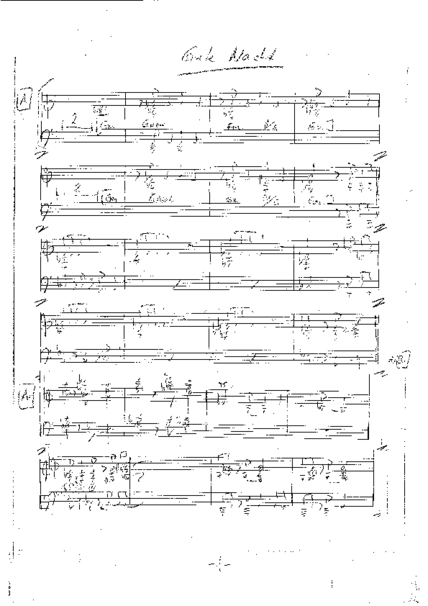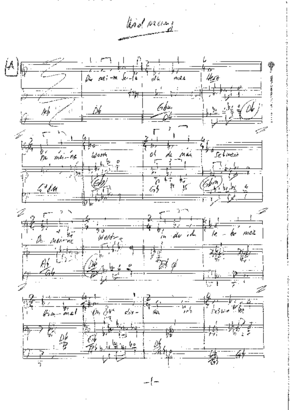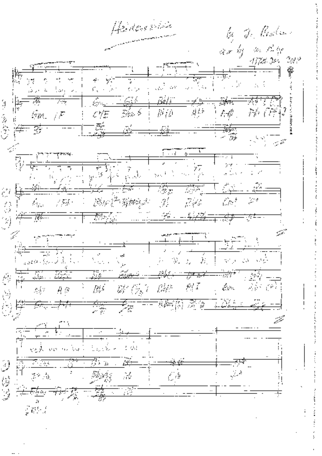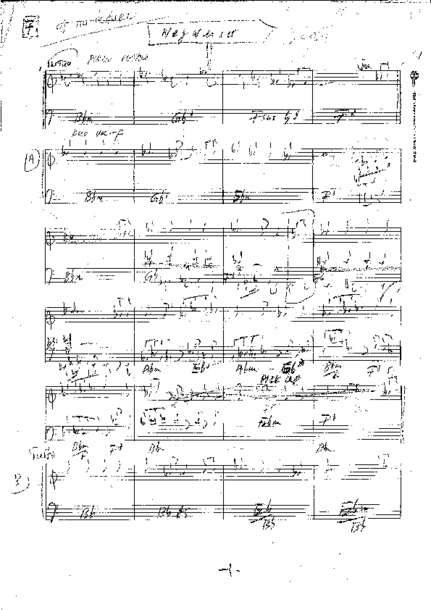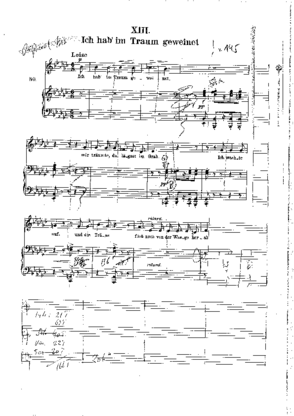Du meine Seele, du mein Herz,
Du meine Wonn', o du mein Schmerz,
Du meine Welt, in der ich lebe,
Mein Himmel du, darin ich schwebe,
O du mein Grab, in das hinab
Ich ewig meinen Kummer gab!
Du bist die Ruh, du bist der Frieden,
Du bist der Himmel, mir beschieden.
Daß du mich liebst, macht mich mir wert,
Dein Blick hat mich vor mir verklärt,
Du hebst mich liebend über mich,
Mein guter Geist, mein bessres Ich!
by Friedrich Rückert
Fremd bin ich eingezogen,
Fremd zieh' ich wieder aus.
Der Mai war mir gewogen
Mit manchem Blumenstrauß.
Das Mädchen sprach von Liebe,
Die Mutter gar von Eh', -
Nun ist die Welt so trübe,
Der Weg gehüllt in Schnee.
Ich kann zu meiner Reisen
Nicht wählen mit der Zeit,
Muß selbst den Weg mir weisen
In dieser Dunkelheit.
Es zieht ein Mondenschatten
Als mein Gefährte mit,
Und auf den weißen Matten
Such' ich des Wildes Tritt.
Was soll ich länger weilen,
Daß man mich trieb hinaus?
Laß irre Hunde heulen
Vor ihres Herren Haus;
Die Liebe liebt das Wandern,
Gott hat sie so gemacht,
Von einem zu dem andern,
Fein Liebchen, gute Nacht.
Will dich im Traum nicht stören,
Wär schad' um deine Ruh'.
Sollst meinen Tritt nicht hören,
Sacht, sacht die Türe zu.
Schreib im Vorübergehen
Ans Tor dir: Gute Nacht,
Damit du mögest sehen,
An dich hab' ich gedacht.
Heidenröslein
Sah ein Knab’ ein Röslein stehn,
Röslein auf der Heiden,
War so jung und morgenschön,
Lief er schnell, es nah zu sehn,
Sah’s mit vielen Freuden.
Röslein, Röslein, Röslein rot,
Röslein auf der Heiden.
Knabe sprach: ich breche dich,
Röslein auf der Heiden!
Röslein sprach: ich steche dich,
Daß du ewig denkst an mich,
Und ich will’s nicht leiden.
Röslein, Röslein, Röslein roth,
Röslein auf der Heiden.
Und der wilde Knabe brach
’s Röslein auf der Heiden;
Röslein wehrte sich und stach,
Half ihm doch kein Weh und Ach,
Mußt’ es eben leiden.
Röslein, Röslein, Röslein roth,
Röslein auf der Heiden.
by Johann Wolfgang von Goethe
In this arrangement the piano accompaniment of the Kunstlied was transposed and transferred into the arrangement. It it present through out the A-part before we let go in the up-tempo B - part that leads into the instrumental solo. It re-appears again in the end and closes with the transposed "original" outro of the Kunstlied.
You are my essence, you‘re my heart
You are my joy, my counterpart,
You are my world, in which I live in,
My heaven you, to which I give in,
You are my grave, in which
Forever I my sorrows gave!
You are my ease, you are my peace,
You are from heaven sent to me,
That you love me makes me feel worthy,
Your gaze has changed just how I see me,
You lift me up through loving me,
My good soul, my better me!
As stranger I arrived,
As stranger I shall leave,
I came and May was kind to me
With many flowers and bouquets.
I met a boy who spoke of love,
Our wedding day was planned.
But now the world seems overcast,
Deep snow lies on the land.
I cannot choose the time to leave
My journey it must be now,
And though I walk in the darkness
I find my way somehow.
A shadowdrawn by moonlight
Will walk by my side,
And on the white meadows
I seek the deer’s trails.
Why should I stay here longer,
until they drive me away,
Let stray dogs howl
Outside their master’s house.
Love wanders where it pleases,
God made it in his sight
It breaks the heart it seizes,
And so my love, good night.
I won’t disturb your dreaming,
And spoil a sleep so pure,
You will not hear me leaving,
I’ll softly close the door.
And on yourgate I’ll write good night
As I am passing through
So when you chance to see it,
You’ll know I thought of you.
Little Red Rose
Saw a boy a little rose,
Red rose on the heathside
Lovely, young in morning light
Had to run up closer.
Spellbound by her beauty,
Little, little rose so red,
Red rose on the heathside.
Said the boy: I'll pick you now,
Red rose on the heathside
Said the rose: I‘ll prick you back,
So that you won‘t forget me,
I shall not surrender.
Little, little rose so red,
Red rose on the heathside.
Yet the wild boy picked the rose
Red rose on the heathside
Red rose faught back with her thorns,
But it didn't help her,
Had to let it happen.
Little, little rose so red,
Red rose on the heathside.
Ich grolle nicht, und wenn das Herz auch bricht,
Ewig verlor'nes Lieb ! Ich grolle nicht.
Wie du auch strahlst in Diamantenpracht,
Es fällt kein Strahl in deines Herzens Nacht.
Das weiß ich längst.
Ich grolle nicht, und wenn das Herz auch bricht,
Ich sah dich ja im Traume,
Und sah die Nacht in deines Herzens Raume,
Und sah die Schlang', die dir am Herzen frißt,
Ich sah, mein Lieb, wie sehr du elend bist.
Ich grolle nicht, ich grolle nicht.
by Heinrich Heine
Why do I avoid the pathways,
Where the other wanderers go,
Why do I take lone trails
Through mountains heavy snow?
I have done no wrong or evil,
No need to shun mankind,
What a foolish longing drives me
Further towards barren lands?
Signposts on the roads are standing
To town lead you they will,
And I travel without ending,
Without rest in search of rest.
There's a signpost ever standing
In my sight unmoved and stern,
There's a road I must be going,
It's the road of no return.
Kein Haus, Keine Heimat
Kein Haus, keine Heimat,
Kein Weib und kein Kind,
So wirbl' ich, ein Strohhalm,
In Wetter und Wind!
Well' auf und Well' nieder,
Bald dort und bald hier;
Welt, fragst du nach mir nicht,
Was frag' ich nach dir?
Meine Jacke ist ganz noch
Und mein Glas noch voll Gin!
Welt, geh' deiner Wege,
Ich frag' nicht, wohin?
Friedrich Halm
In this arrangement by rüegg it is clearly visible that the "original" is part of the re-arranged version. It appears, reappears as either the intro, transition or the ending. It is constantly present. The original piano accompaniment by Schumann becomes part of the arrangenemt and is repeated in a new context.
Find the whole cycle including pdfs, soundfiles and poems right HERE.
cover photo by Severin Koller for the album A Winter's Journey
by Lia Pale arranged by mathias rüegg released on Lotus Records (2017)
cover photo by Severin Koller for the album The Schumann Song Book
by Lia Pale arranged by mathias rüegg released on Lotus Records (2017)
Was vermeid' ich denn die Wege,
Wo die ander'n Wand'rer geh'n,
Suche mir versteckte Stege,
Durch verschneite Felsenhöh'n?
Habe ja doch nichts begangen,
Daß ich Menschen sollte scheu'n,
Welch ein törichtes Verlangen
Treibt mich in die Wüstenei'n?
Weiser stehen auf den Straßen,
Weisen auf die Städte zu.
Und ich wandre sonder Maßen
Ohne Ruh' und suche Ruh'.
Einen Weiser seh' ich stehen
Unverrückt vor meinem Blick;
Eine Straße muß ich gehen,
Die noch keiner ging zurück.
Find the whole album including soundfiles and poems right HERE.
I don‘t complain, though I may die of pain,
Love forever lost!I don‘t complain.
For you may shine like diamonds clear and bright,
I see your heart remains in darkest night,
I always knew.
I don‘t complain, though I may die of pain.
I saw you while I was dreaming,
I‘ve seen the night that through your heart is streaming,
I‘ve seen the pain that pierces through your heart,
I‘ve seen, my love, how sad you truly are.
Find the whole album including soundfiles and poems right HERE.
Cover of the booklet about the project The Great European Song Book - a Kunstlied-Trilogy
an adaptation of 55 Kunstlieder into songs by Julia Pallanch and mathias rüegg
that includes three albums A Winter's Journey (2017), The Schumann Song Book (2017)
& The Brahms Song Book (2019) released on Lotus Records.
No House, No Home
No house, no home,
No wife, no kid,
I‘m tossed like a feather
Through weather and wind!
Once up, and then down,
Blown here and then there,
World, if you ignore me,
Well, why should I care?
My jacket's still whole
And my glass full of gin!
World, just go your way,
I won‘t ask where you‘ve been?
Into a silent graveyard
My pathway now has led,
So this is where I stop off,
I'm thinking to myself.
Those crowns of bloom and sadness
Might well be welcome signs,
Inviting weary travelers
Into its cool confines.
Have all the rooms been taken
Is there one left for me?
With weariness I'm sinking,
I'm bruised so painfully.
Oh tavern please have mercy,
Why would you turn me away?
Then onward, still further,
My faithful walking staff.
"There is also a faithfulness to the original as regards content, I thought to myself, the faithfulness of expression."
This quote is taken from the Liner Notes for the booklet to the project The Great European Song Book written by the classical pianist Oliver Schnyder about the album A Winter's Journey (2017) released on Lotus Records.
Ich hab' im Traum geweinet,
mir träumte du lägest im Grab.
Ich wachte auf, und die Träne
floß noch von der Wange herab.
Ich hab' im Traum geweinet,
mir träumt' du verließest mich.
Ich wachte auf, und ich weinte
noch lange bitterlich.
Ich hab' im Traum geweinet,
mir träumte du wär'st mir noch gut.
Ich wachte auf, und noch immer
strömt meine Tränenflut.
by Heinrich Heine
Auf einen Totenacker
Hat mich mein Weg gebracht;
Allhier will ich einkehren,
Hab ich bei mir gedacht.
Ihr grünen Totenkränze
Könnt wohl die Zeichen sein,
Die müde Wand'rer laden
Ins kühle Wirtshaus ein.
Sind denn in diesem Hause
Die Kammern all' besetzt ?
Bin matt zum Niedersinken,
Bin tödlich schwer verletzt.
O unbarmherz'ge Schenke,
Doch weisest du mich ab ?
Nun weiter denn, nur weiter,
Mein treuer Wanderstab.
Liebestreu
"O versenk', o versenk' dein Leid,
mein Kind, in die See, in die tiefe See!"
Ein Stein wohl bleibt auf des Meeres Grund,
mein Leid kommt stets in die Höh'.
"Und die Lieb', die du im Herzen trägst,
brich sie ab, brich sie ab, mein Kind!"
Ob die Blum' auch stirbt, wenn man sie bricht,
treue Lieb' nicht so geschwind.
"Und die Treu', und die Treu',
's war nur ein Wort, in den Wind damit hinaus."
O Mutter und splittert der Fels auch im Wind,
Meine Treue, die hält ihn aus.
by Robert Reineck
I start this arrangement with singing the "original"
a capella humming the melody without singing the poem. It is accompanied only by egg shakers. Again the Kunstlied is present within the song. The humming of Schumann's melody both introduces the music and at the same time leads into the adaption of the song in a jazz context.
In my dreams I’ve been crying,
I dreamt you lay there in a grave,
Then I woke up, and my tears
Kept streaming down from my cheek.
In my dreams I’ve been crying,
I dreamt that you‘d walked out on me.
Then I woke up, and I cried
Still for a long time.
In my dreams I’ve been crying,
I dreamt that you still were with me.
Then I woke up, still I am crying
Leaving floods of tears.
Faith in Love
"Oh drown, deep down your grief,
My child, in the sea, in the deep blue sea!"
A stone may stay on the ocean's bed
My pain will show again.
"And your love, that you carry in your heart,
Tear it up, let it go, my child!"
Though a flower may die, once it is picked,
True love won't break like this.
"'And faith, and faith,
T'was only a word, let it go out with the wind."
Oh mom, though the rock erodes in the wind
Still my faith it shall endure.
